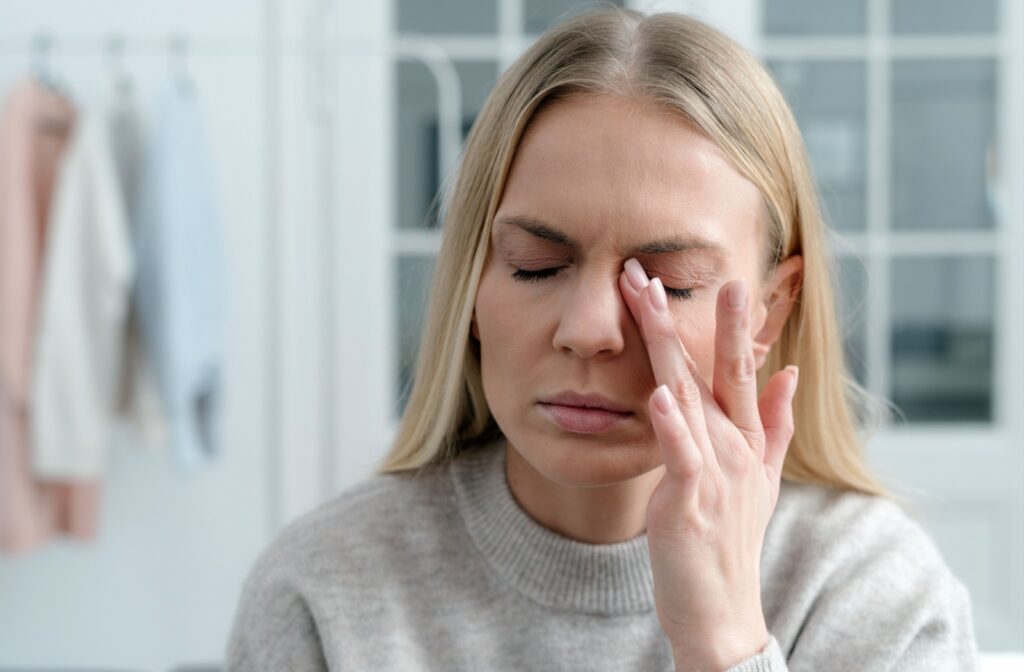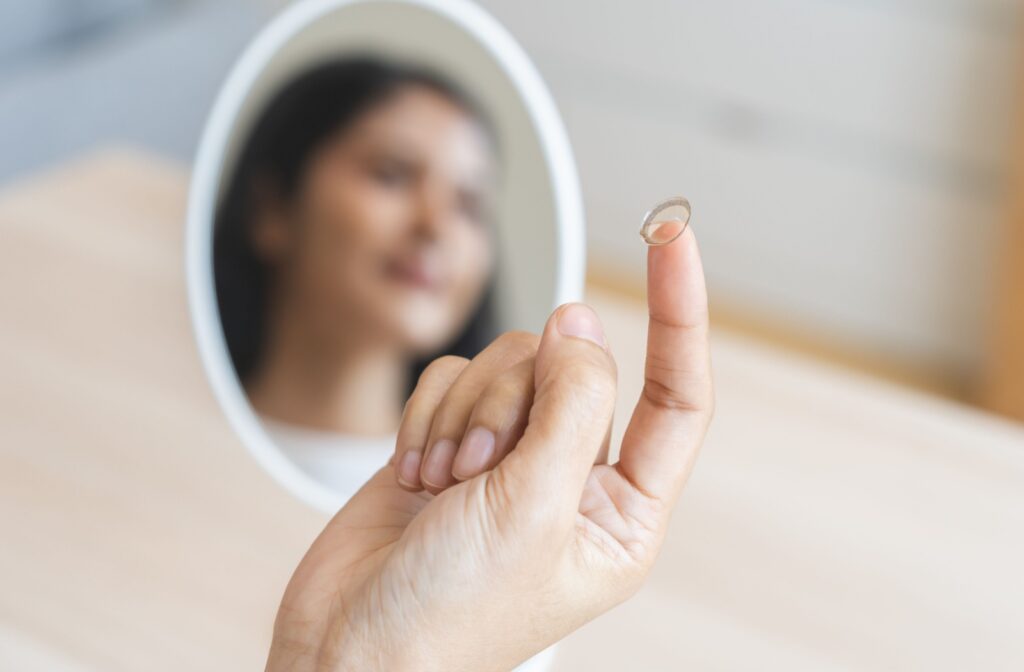Dry eyes can be more than a nuisance. They can cause discomfort, blurry vision, and even affect your ability to wear contact lenses. For many individuals with dry eye syndrome, the question is unavoidable: Can you wear contact lenses if you have dry eyes?
The short answer is yes! While dry eyes can make contact lens wear more challenging, there are several solutions available to make it possible and comfortable. With the help of the right eye care professional and appropriate contact lens options, you can enjoy clear vision without discomfort. Here’s what you need to know.
Understanding Dry Eyes & Contact Lenses
Dry eye syndrome occurs when your eyes don’t produce enough tears or the tears evaporate too rapidly. This can cause symptoms like irritation, redness, a gritty sensation, and even sensitivity to light.
When it comes to wearing contact lenses, individuals with dry eyes may find that traditional lenses exacerbate their symptoms. Contact lenses sit directly on the surface of your eyes, which can interfere with tear film. A disrupted tear film may make contact lenses uncomfortable or dry out faster.
But there’s good news: Modern technology and expert care have made it easier than ever to manage this issue effectively.
Choosing the Right Contact Lenses for Dry Eyes
If you have dry eyes, some types of contact lenses are better suited for your condition. Here are a few popular options to consider:
1. Daily Disposable Lenses
Daily disposable lenses are ideal for individuals with dry eyes because they allow you to start fresh with a new pair of lenses every day. Since they are replaced so frequently, there is less chance of debris or protein build-up, which can contribute to irritation.
2. Silicone Hydrogel Lenses
Silicone hydrogel lenses allow more oxygen to pass through to your eyes compared to traditional soft lenses. This improves overall eye comfort and reduces the risk of dryness.
3. Scleral Lenses
Scleral lenses are larger in size and rest on the sclera (the white part of your eye) rather than the cornea. The space between the lens and the cornea is filled with a fluid reservoir that helps to keep your eyes hydrated throughout the day. These lenses are especially beneficial for those with severe dry eye symptoms.
4. Hydrogel Lenses with Moisture Retention
Some contact lenses are specially designed with integrated moisturizing agents to retain moisture and provide better hydration for those with dry eyes.
5. Hybrid Lenses
Hybrid lenses combine the features of both rigid and soft lenses. Their hard center provides crisp vision, while their soft outer rim ensures comfort and moisture retention, making them a great choice for mild dry eye sufferers.
Tips for Wearing Contact Lenses with Dry Eyes

If you have dry eyes and want to wear contact lenses, taking these additional steps can greatly enhance your comfort:
Use Prescribed Eye Drops
Your eye care provider may recommend lubricating eye drops or artificial tears specifically formulated for contact lens wearers. These drops can provide extra moisture to help reduce irritation.
Maintain Proper Lens Hygiene
Follow all instructions for cleaning, storing, and replacing your contact lenses. Proper hygiene reduces the risk of debris or bacteria that make dry eye symptoms worse.
Limit Screen Time
Prolonged screen use can exacerbate dry eyes since we tend to blink less while staring at screens. Make sure to follow the 20-20-20 rule—every 20 minutes, look at something 20 feet away for 20 seconds.
Stay Hydrated
Drink plenty of water throughout the day to maintain overall hydration, which can support tear production.
Invest in a Humidifier
Using a humidifier indoors can help maintain a comfortable level of moisture in the air and prevent your eyes from drying out, especially in dry climates or during winter.
When to Consult an Eye Care Professional
If you’re struggling with dry eyes and contact lens discomfort, it’s important to consult with an experienced eye care professional who can recommend a personalized solution. They may provide additional treatments to manage your dry eye symptoms, such as:
- OptiLight by Lumenis: A cutting-edge treatment designed to improve tear stability and reduce inflammation, available at Vision One Boise.
- Prescription Medications: Eye drops or medications that treat underlying causes of dry eyes.
- Lifestyle Adjustments: Advice on managing environmental factors or habits that contribute to dryness.
Enhancing Your Contact Lens Experience at Vision One Boise
At Vision One Boise, we specialize in helping individuals with dry eyes find comfortable and effective contact lens solutions. Our experienced team offers customized advice, advanced treatments, and a variety of lens options designed specifically for dry eye sufferers.
If you’re ready to make dry eye discomfort a thing of the past, request your appointment today and explore how Vision One Boise can help you enjoy clear, comfortable vision. Our tech-driven, personalized dry eye therapy ensures your eyes stay healthy and happy.
Don’t give up on contact lenses—together, we’ll find the perfect fit for you!



